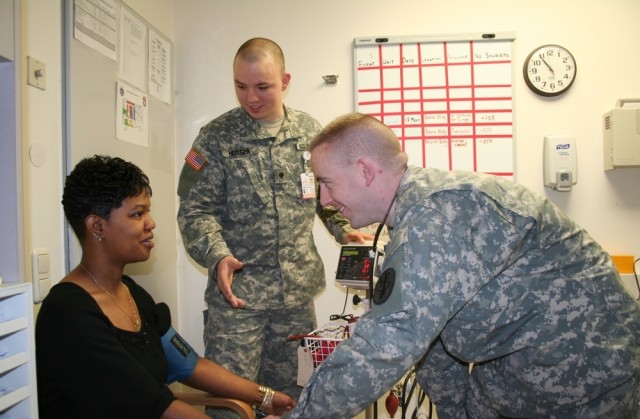
BAMBERG, Germany - The Bamberg Warrior Transition Unit is looking beyond the physical injury in addressing the mind, spirit and heart of each injured Soldier by incorporating part-time work into their daily routines.
A WTU Soldier's priority is his medical appointments with his primary care physician; then responsibility to his unit; and then to his vocational interests or even a job, said squad leader Staff Sgt. Ronald Chitty.
Bamberg's WTU activated as part of the Army Medical Action Plan, as the first four wounded Soldiers arrived in November 2007, with that number currently standing at 22.
Chitty is charged with helping the unit stay focused on the mission, and, along with Kyshone Moss, a nurse case manager, is using the Soldiers' input to build and refine programs.
"Soldiers facing MEBs (Medical Evaluation Boards) are really talking about the need to adapt to civilian life," said Joseph Pehm, Social Work Services chief, who oversees a monthly support group for WTU members.
Support during transition is especially important for those undergoing an MEB, which determines if a Soldier still meets the minimum requirements to remain in the military.
To help deal with the mind and the spirit of a Soldier, "we treat the whole person - not just the injury - because it is about the transition as well," Pehm said.
It's about helping Soldiers, he stressed, to answer the question: "What will it mean to me and my life if I can't continue to work for the Army'"
Chitty addresses these concerns head-on. "All my warriors work, Bamberg is 100 percent employed," he said proudly, giving credit to unit and garrison leadership for their support.
Spc. Mica B. Kells, 23, was one of the first Soldiers to join the WTU. Kells, a former mechanic with the 173rd Brigade Support Battalion, now can be found assisting Soldiers during in-processing at Army Community Services.
"There is a real need for this kind of program," said Kells. He explained how the WTU provides direction and speeds up the process of getting a troop back to his regular Army duties quicker or onto another focus, such as school.
The WTU was a big change of pace for Spc. Chadwick Mollohan, 25, who has deployed twice during his Army career, and was also working as a mechanic with the 173rd BSB. "I went into something that revolved around me instead of me working for something," he said.
As a WTU charter member, he has been a valuable resource in developing and refining processes for the Soldier and Family Assistance Center located at ACS. Mollohan believes that having a job gives people "a purpose."
ACS isn't the only garrison agency working with the WTU. Soldiers have been placed in positions at the health clinic, Military Police, the Directorate of Public Works, tax office, U.S. Army Garrison Bamberg, Headquarters and Headquarters Detachment, and the consolidated mailroom.
WTU Soldier Sgt. Jamerson Hayward is currently training to assist with medical screenings at the Bamberg Health Clinic. Hayward, a former Navy medical corpsman, is excited about the opportunity to use his skills to help others while recovering from his own injuries. With almost 12 years of active-duty service, he believes a program such as the WTU is "absolutely necessary."
"With this unit, there is no way to get lost in the system," he added.
Chitty said all participating agencies are aware of the Soldiers' restrictions - and their number-one priority: their appointments. Most of the work is administrative, although some Soldiers earn certifications they can use in the future, or do jobs that prepare them for a different military occupational specialty. In one Soldier's case, the work is directly related to a professional degree.
"I love my job," Chitty said. "There (aren't any) of my warriors working at a job right now that they don't like. They tell me, and their supervisors tell me, on a weekly basis."

Social Sharing